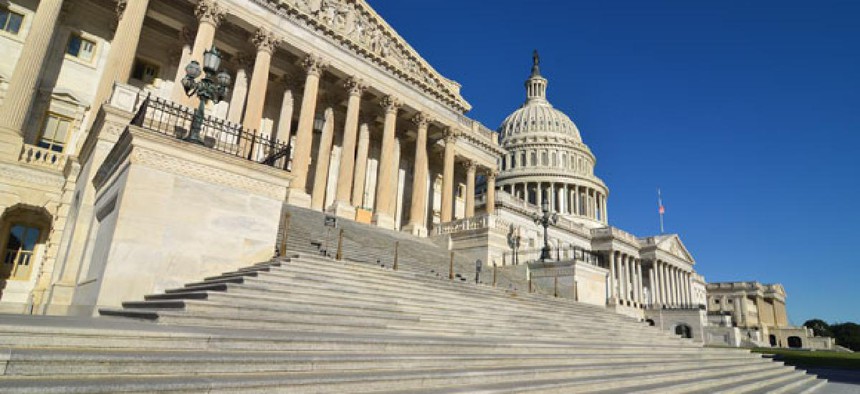
Orhan Cam/Shutterstock.com
House passes No Budget, No Pay
Bill temporarily suspends debt ceiling, links lawmakers’ salaries to budget process.
The House on Wednesday voted to temporarily suspend the debt ceiling until May, and to withhold lawmakers’ pay if Congress cannot agree on a fiscal 2014 budget by April 15.
The Senate likely will pass the legislation, and the White House said it will not oppose it.
The No Budget No Pay bill (H.R. 325) would authorize a temporary suspension of the current debt limit of $16.4 trillion through May 18, allowing the government to continue borrowing to pay its bills until then. A provision in the legislation would prohibit lawmakers from getting paid if Congress fails to pass a budget by April 15. Salaries would be held in escrow until lawmakers agreed on a fiscal 2014 budget; if Congress fails to do so, then salaries would resume in January 2015, the end of the current congressional session.
House GOP leadership late last week indicated they would fast-track the legislation. Another bill, which would extend the current pay freeze for federal employees through the end of the year, was postponed so lawmakers could vote on the No Budget, No Pay legislation this week.
Democrats on the House floor Wednesday blasted Republicans for pushing a bill that kicks the fiscal can down the road. Rep. Chris Van Hollen, D-Md., said the temporary debt limit suspension “sets up what amounts to another fiscal cliff,” while House Minority Whip Steny Hoyer, D-Md., called the bill, which links lawmakers’ pay with the budget process, a “political gimmick.”
Republicans reiterated the need to do something immediately to tackle deficit reduction. “It is time for Congress to get serious about this, and this is the first step to bring fiscal responsibility to Washington,” said House Speaker John Boehner, R-Ohio. “It’s real simple: No budget, no pay.”
Republicans frequently argue that the Democratic-controlled Senate has not passed a budget in nearly four years. “All we're saying is: if the President and the Senate, if this country needs to incur more debt -- Senate, please show us your plan to repay that debt, please show us your plan to control spending,” said House Majority Leader Eric Cantor, R-Va., on Tuesday, defending H.R. 325.
Sen. Majority Leader Harry Reid, D-Nev., during a Wednesday press conference with other Democratic leaders, disputed the notion that the Senate had not passed a budget in the last four years, citing the 2011 Budget Control Act in particular. Reid said the Senate will consider the No Budget, No Pay bill “as quickly as possible” and that the House proposal was “not worth fighting about.” Reid also got a few digs in, implying the congressional pay provision was a gimmick. “They need a gimmick or two to get things done over there,” Reid said.
Reid and Sen. Patty Murray, D-Wash., said the upper chamber would move a budget resolution through the Budget Committee and to the Senate floor -- which Murray said had been in the works before the House introduced its short-term debt ceiling measure. Murray said she hoped the House GOP was serious about going back to the “normal budget process,” and that they would stop introducing brinkmanship into fiscal debates.
Regarding H.R. 325, there is some dispute over whether the provision regarding congressional compensation passes muster. The 27th Amendment to the U.S. Constitution prohibits a sitting Congress from increasing or decreasing its own pay, although it can change the pay of future legislative bodies. Republicans argue that placing salaries in escrow does not change the rate of lawmakers’ pay, and therefore is constitutional.
The public apparently favors docking the pay of Congress and the president for failing to balance the budget. A whopping 81 percent of voters believe lawmakers should take a 25 percent pay cut until the federal budget is balanced, according to a new survey from Rasmussen Reports.
Forty-six percent of voters said the president should take a 50 percent pay cut until the budget is balanced, while 37 percent don’t believe a salary reduction is necessary, the survey showed.
The poll, conducted this past weekend, also asked respondents about federal pensions. Fifty-nine percent of the 1,000 respondents said lawmakers should not receive a pension when they leave office, while 23 percent were in favor of giving them that benefit. The sentiment over whether the president should receive a pension after leaving office was more divided: 40 percent said they believed the president should receive a pension, while 48 percent said he should not.
NEXT STORY: Fed pay freeze vote postponed







